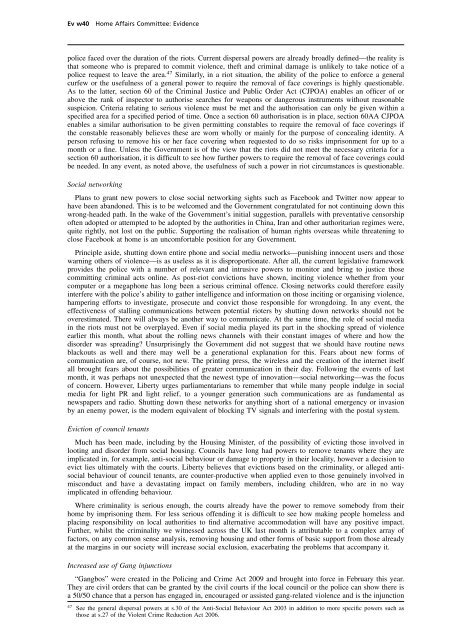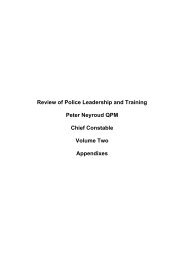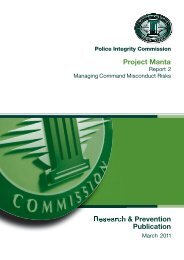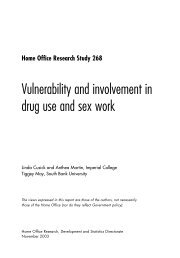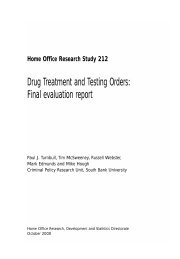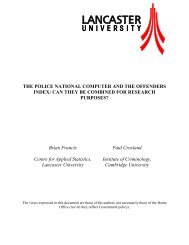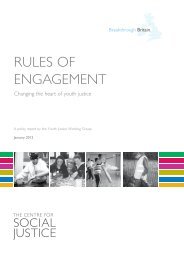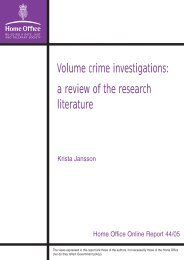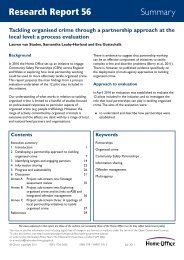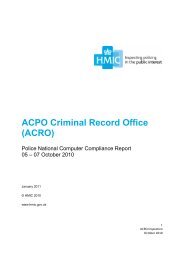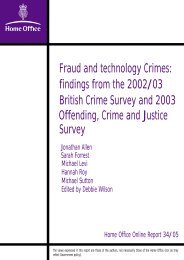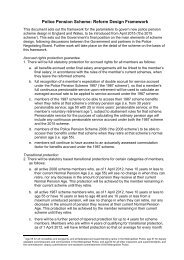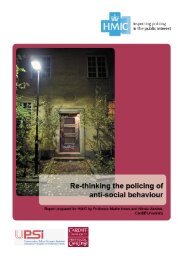Policing Large Scale Disorder: Lessons from the disturbances of ...
Policing Large Scale Disorder: Lessons from the disturbances of ...
Policing Large Scale Disorder: Lessons from the disturbances of ...
You also want an ePaper? Increase the reach of your titles
YUMPU automatically turns print PDFs into web optimized ePapers that Google loves.
Ev w40 Home Affairs Committee: Evidence<br />
police faced over <strong>the</strong> duration <strong>of</strong> <strong>the</strong> riots. Current dispersal powers are already broadly defined—<strong>the</strong> reality is<br />
that someone who is prepared to commit violence, <strong>the</strong>ft and criminal damage is unlikely to take notice <strong>of</strong> a<br />
police request to leave <strong>the</strong> area. 47 Similarly, in a riot situation, <strong>the</strong> ability <strong>of</strong> <strong>the</strong> police to enforce a general<br />
curfew or <strong>the</strong> usefulness <strong>of</strong> a general power to require <strong>the</strong> removal <strong>of</strong> face coverings is highly questionable.<br />
As to <strong>the</strong> latter, section 60 <strong>of</strong> <strong>the</strong> Criminal Justice and Public Order Act (CJPOA) enables an <strong>of</strong>ficer <strong>of</strong> or<br />
above <strong>the</strong> rank <strong>of</strong> inspector to authorise searches for weapons or dangerous instruments without reasonable<br />
suspicion. Criteria relating to serious violence must be met and <strong>the</strong> authorisation can only be given within a<br />
specified area for a specified period <strong>of</strong> time. Once a section 60 authorisation is in place, section 60AA CJPOA<br />
enables a similar authorisation to be given permitting constables to require <strong>the</strong> removal <strong>of</strong> face coverings if<br />
<strong>the</strong> constable reasonably believes <strong>the</strong>se are worn wholly or mainly for <strong>the</strong> purpose <strong>of</strong> concealing identity. A<br />
person refusing to remove his or her face covering when requested to do so risks imprisonment for up to a<br />
month or a fine. Unless <strong>the</strong> Government is <strong>of</strong> <strong>the</strong> view that <strong>the</strong> riots did not meet <strong>the</strong> necessary criteria for a<br />
section 60 authorisation, it is difficult to see how fur<strong>the</strong>r powers to require <strong>the</strong> removal <strong>of</strong> face coverings could<br />
be needed. In any event, as noted above, <strong>the</strong> usefulness <strong>of</strong> such a power in riot circumstances is questionable.<br />
Social networking<br />
Plans to grant new powers to close social networking sights such as Facebook and Twitter now appear to<br />
have been abandoned. This is to be welcomed and <strong>the</strong> Government congratulated for not continuing down this<br />
wrong-headed path. In <strong>the</strong> wake <strong>of</strong> <strong>the</strong> Government’s initial suggestion, parallels with preventative censorship<br />
<strong>of</strong>ten adopted or attempted to be adopted by <strong>the</strong> authorities in China, Iran and o<strong>the</strong>r authoritarian regimes were,<br />
quite rightly, not lost on <strong>the</strong> public. Supporting <strong>the</strong> realisation <strong>of</strong> human rights overseas while threatening to<br />
close Facebook at home is an uncomfortable position for any Government.<br />
Principle aside, shutting down entire phone and social media networks—punishing innocent users and those<br />
warning o<strong>the</strong>rs <strong>of</strong> violence—is as useless as it is disproportionate. After all, <strong>the</strong> current legislative framework<br />
provides <strong>the</strong> police with a number <strong>of</strong> relevant and intrusive powers to monitor and bring to justice those<br />
committing criminal acts online. As post-riot convictions have shown, inciting violence whe<strong>the</strong>r <strong>from</strong> your<br />
computer or a megaphone has long been a serious criminal <strong>of</strong>fence. Closing networks could <strong>the</strong>refore easily<br />
interfere with <strong>the</strong> police’s ability to ga<strong>the</strong>r intelligence and information on those inciting or organising violence,<br />
hampering efforts to investigate, prosecute and convict those responsible for wrongdoing. In any event, <strong>the</strong><br />
effectiveness <strong>of</strong> stalling communications between potential rioters by shutting down networks should not be<br />
overestimated. There will always be ano<strong>the</strong>r way to communicate. At <strong>the</strong> same time, <strong>the</strong> role <strong>of</strong> social media<br />
in <strong>the</strong> riots must not be overplayed. Even if social media played its part in <strong>the</strong> shocking spread <strong>of</strong> violence<br />
earlier this month, what about <strong>the</strong> rolling news channels with <strong>the</strong>ir constant images <strong>of</strong> where and how <strong>the</strong><br />
disorder was spreading? Unsurprisingly <strong>the</strong> Government did not suggest that we should have routine news<br />
blackouts as well and <strong>the</strong>re may well be a generational explanation for this. Fears about new forms <strong>of</strong><br />
communication are, <strong>of</strong> course, not new. The printing press, <strong>the</strong> wireless and <strong>the</strong> creation <strong>of</strong> <strong>the</strong> internet itself<br />
all brought fears about <strong>the</strong> possibilities <strong>of</strong> greater communication in <strong>the</strong>ir day. Following <strong>the</strong> events <strong>of</strong> last<br />
month, it was perhaps not unexpected that <strong>the</strong> newest type <strong>of</strong> innovation—social networking—was <strong>the</strong> focus<br />
<strong>of</strong> concern. However, Liberty urges parliamentarians to remember that while many people indulge in social<br />
media for light PR and light relief, to a younger generation such communications are as fundamental as<br />
newspapers and radio. Shutting down <strong>the</strong>se networks for anything short <strong>of</strong> a national emergency or invasion<br />
by an enemy power, is <strong>the</strong> modern equivalent <strong>of</strong> blocking TV signals and interfering with <strong>the</strong> postal system.<br />
Eviction <strong>of</strong> council tenants<br />
Much has been made, including by <strong>the</strong> Housing Minister, <strong>of</strong> <strong>the</strong> possibility <strong>of</strong> evicting those involved in<br />
looting and disorder <strong>from</strong> social housing. Councils have long had powers to remove tenants where <strong>the</strong>y are<br />
implicated in, for example, anti-social behaviour or damage to property in <strong>the</strong>ir locality, however a decision to<br />
evict lies ultimately with <strong>the</strong> courts. Liberty believes that evictions based on <strong>the</strong> criminality, or alleged antisocial<br />
behaviour <strong>of</strong> council tenants, are counter-productive when applied even to those genuinely involved in<br />
misconduct and have a devastating impact on family members, including children, who are in no way<br />
implicated in <strong>of</strong>fending behaviour.<br />
Where criminality is serious enough, <strong>the</strong> courts already have <strong>the</strong> power to remove somebody <strong>from</strong> <strong>the</strong>ir<br />
home by imprisoning <strong>the</strong>m. For less serious <strong>of</strong>fending it is difficult to see how making people homeless and<br />
placing responsibility on local authorities to find alternative accommodation will have any positive impact.<br />
Fur<strong>the</strong>r, whilst <strong>the</strong> criminality we witnessed across <strong>the</strong> UK last month is attributable to a complex array <strong>of</strong><br />
factors, on any common sense analysis, removing housing and o<strong>the</strong>r forms <strong>of</strong> basic support <strong>from</strong> those already<br />
at <strong>the</strong> margins in our society will increase social exclusion, exacerbating <strong>the</strong> problems that accompany it.<br />
Increased use <strong>of</strong> Gang injunctions<br />
“Gangbos” were created in <strong>the</strong> <strong>Policing</strong> and Crime Act 2009 and brought into force in February this year.<br />
They are civil orders that can be granted by <strong>the</strong> civil courts if <strong>the</strong> local council or <strong>the</strong> police can show <strong>the</strong>re is<br />
a 50/50 chance that a person has engaged in, encouraged or assisted gang-related violence and is <strong>the</strong> injunction<br />
47 See <strong>the</strong> general dispersal powers at s.30 <strong>of</strong> <strong>the</strong> Anti-Social Behaviour Act 2003 in addition to more specific powers such as<br />
those at s.27 <strong>of</strong> <strong>the</strong> Violent Crime Reduction Act 2006.


